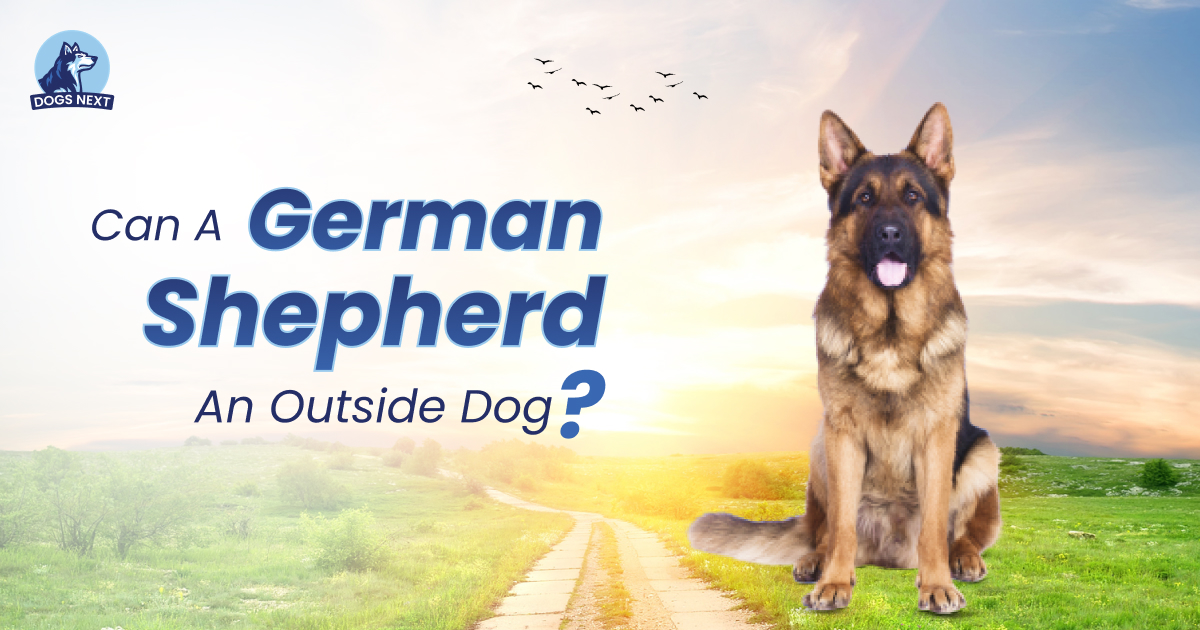Are you contemplating whether a German Shepherd can be an outside dog? Known for their loyalty, intelligence, and versatility, German Shepherds are a popular breed worldwide.
Yes, German Shepherds can be kept as outside dogs, but it is important to provide them with proper shelter, socialization, and attention to ensure their well-being. If they are left outside for extended periods without adequate human contact and stimulation, they can become bored, and lonely, and potentially develop behavioral issues.
In this article, we will delve into the topic of outdoor living for German Shepherds. We will explore their nature, discuss essential factors to consider, weigh the pros and cons, and provide valuable tips for successfully raising an outdoor German Shepherd.
Dangers of Leaving a German Shepherd Outside
When considering whether a German Shepherd can be an outside dog, it’s crucial to be aware of the potential dangers that extreme weather conditions can pose. Both hot and cold weather can adversely affect these dogs if they are left outside without proper precautions.
Hot Weather
German Shepherds have a thick double coat, which can make them prone to heat-related issues. They are susceptible to heatstroke, dehydration, and sunburn. When exposed to high temperatures for prolonged periods, they may struggle to regulate their body temperature, leading to overheating. Heatstroke can be life-threatening and requires immediate veterinary attention.
Cold Weather
While German Shepherds have a dense coat that provides some insulation, extreme cold temperatures can still pose risks. They can suffer from frostbite, hypothermia, and discomfort in freezing conditions. It’s important to ensure they have adequate shelter, protection from wind and moisture, and access to warmth during cold weather.
Dangers of Leaving a German Shepherd Outside:
| Weather Condition | Potential Risks |
| Hot Weather | Heatstroke, dehydration, sunburn |
| Cold Weather | Frostbite, hypothermia, discomfort |
The Nature of German Shepherds
They were initially bred for herding and working purposes, and their nature reflects these traits. They are known for their energy, agility, and willingness to learn. German Shepherds thrive when provided with mental and physical stimulation.
These dogs have a strong protective instinct, making them excellent guard dogs. They are naturally inclined to be watchful, attentive, and protective of their families. German Shepherds are known to form deep bonds with their owners and are often affectionate and loving.
Moreover, German Shepherds require regular exercise and mental engagement to maintain their well-being. They excel in various activities such as obedience training, agility courses, and interactive play. Failing to provide adequate stimulation can lead to boredom, restlessness, and behavioral issues.
Understanding the nature of German Shepherds is essential when deciding if they can be outside dogs. Their activity level, need for social interaction, and exercise requirements should be taken into account to ensure a happy and fulfilled canine companion.
Factors to Consider for Outdoor Living
Climate and Weather Conditions
Consider the temperature ranges, humidity levels, and extremes of weather such as intense heat or cold. It’s important to ensure that the climate is suitable and that your dog will have proper protection from extreme conditions.
Living Space and Shelter:
Adequate living space and suitable shelter are essential for an outdoor German Shepherd. They need enough room to move, play, and explore comfortably. Provide a secure and spacious fenced area to prevent wandering and potential dangers. Additionally, ensure that they have a well-constructed and insulated shelter that offers protection from the elements.
Exercise and Mental Stimulation
German Shepherds are an active and intelligent breed that requires regular exercise and mental stimulation. Outdoor living can provide ample space for them to engage in physical activities like running, fetching, and playing. However, it’s crucial to commit to providing consistent exercise routines and mental stimulation to prevent boredom and potential behavior problems.
Socialization and Human Interaction
German Shepherds thrive on human companionship and social interaction. Even if they are primarily kept outside, it’s crucial to ensure they receive regular socialization with people. Frequent human interaction, training sessions, and bonding activities are necessary to maintain their emotional well-being.
Pros and Cons of Keeping a German Shepherd Outside
Advantages of Outdoor Living
- Opportunity for ample exercise and physical activity.
- Possibility for a larger living space.
- Less risk of damage to indoor areas.
- Potential for fulfilling their natural instincts, such as exploring and patrolling.
Disadvantages of Outdoor Living
- Exposure to extreme weather conditions.
- Potential lack of socialization and human interaction.
- Increased risk of health issues due to inadequate shelter or care.
- Limited supervision and potential security risks.
It’s important to weigh these factors carefully before deciding on the best living arrangement for your German Shepherd.
Tips for Successfully Raising an Outdoor German Shepherd
Adequate Shelter and Protection
Ensure your outdoor German Shepherd has a well-constructed shelter that protects it from the elements. The shelter should be insulated, elevated, and spacious enough for them to rest comfortably. Additionally, provide shade and protection from wind and rain within the outdoor area.
Regular Exercise and Playtime
Commit to a consistent exercise routine for your German Shepherd. Provide daily opportunities for physical activities such as walks, runs, and playtime. Engage in interactive games and use toys that stimulate their minds and keep them active.
Proper Nutrition and Hydration
Offer a balanced and nutritious diet tailored to your German Shepherd’s needs. Provide fresh water at all times, especially during hot weather. Monitor their food intake to ensure they maintain a healthy weight and consult with a veterinarian for dietary recommendations.
Veterinary Care and Health Monitoring
Schedule regular veterinary check-ups for your outdoor German Shepherd. Maintain up-to-date vaccinations, parasite control, and preventive care. Monitor their overall health, including dental hygiene, and promptly address any signs of illness or discomfort.
Mental Stimulation and Training
Keep your German Shepherd mentally stimulated through training exercises, puzzle toys, and interactive play. Engage in obedience training to establish boundaries and reinforce good behavior. Mental stimulation is crucial for their overall well-being and helps prevent boredom.
Socialization and Bonding
Despite being an outdoor dog, socialization is still important for your German Shepherd. Provide opportunities for them to interact with other dogs and people. Regularly spend quality time with your dog, engaging in activities that strengthen the bond between you and promote their emotional well-being.
Alternatives for German Shepherds Who Are Not Suited for Outdoor Living
While some German Shepherds thrive in outdoor environments, not all are suited for outdoor living. If your German Shepherd shows signs of distress or discomfort when kept outside, it may be best to consider alternative arrangements.
Options include providing a secure indoor space or utilizing a combination of outdoor and indoor living, where the dog has access to both environments. Each dog is unique, and it’s essential to assess their individual needs and well-being when determining the most suitable living arrangement.
Frequently Asked Questions
Q: Can I leave my German Shepherd outside in the rain?
Ans: While German Shepherds can tolerate some rain, it is best to provide them with the shelter to keep them dry and protected from prolonged exposure to wet weather.
Q: How long do outdoor German Shepherds live?
Ans: The lifespan of outdoor German Shepherds is similar to those kept indoors, typically ranging from 10 to 14 years. Proper care, nutrition, and regular veterinary check-ups contribute to their longevity.
Q: Can a German Shepherd be a house dog?
Ans: Yes, German Shepherds can make excellent house dogs. They thrive on human companionship and can adapt well to indoor living, as long as they receive sufficient exercise, mental stimulation, and social interaction.
Q: How long can a German Shepherd stay outside in the cold?
Ans: German Shepherds can tolerate cold temperatures, but the duration they can stay outside in the cold depends on factors such as coat thickness, shelter availability, and individual tolerance.
Q: German Shepherd indoor or outdoor dog?
Ans: German Shepherds can be both indoor and outdoor dogs, but it ultimately depends on their individual needs, preferences, and the owner’s circumstances. Proper care, socialization, exercise, and mental stimulation are essential regardless of the living arrangement.
Q: At what age can a German Shepherd sleep outside?
Ans: The appropriate age for a German Shepherd to sleep outside can vary. It is generally recommended to wait until they have reached physical and mental maturity, which is typically around 6 to 12 months of age.
Conclusion
In conclusion, the question “Can a German Shepherd be an outside dog?” requires careful consideration and assessment of various factors. While German Shepherds possess qualities that can make them adaptable to outdoor living, it is crucial to prioritize their well-being and safety. Understanding the breed’s nature, providing adequate shelter, addressing climate and weather conditions, ensuring regular exercise and mental stimulation, and promoting socialization and bonding are all key elements in successfully raising an outdoor German Shepherd.
It is important to remember that not all German Shepherds are suited for outdoor living, and alternative arrangements should be considered if the dog shows signs of discomfort or distress. Each dog is unique, and their individual needs and preferences should be taken into account when determining the most suitable living environment.
So, whether you choose to keep your German Shepherd outside or explore alternative arrangements, always prioritize their welfare and provide the care and attention they deserve.

I’m David, an expert contributor and writer, with two furry friends of my own, I know the challenges of raising and caring for dogs. From training to nutrition and health, my goal is to provide valuable insights and advice to help create strong bonds and happy, healthy lives. Find me in Twitter.




